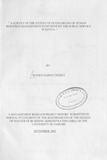| dc.description.abstract | Since the attainment of political independence in 1963. the Public Service in. Kenya has
continued to playa pivotal role in the delivery of services to the public. Human Resource
Management has been at the centre of activities geared towards better performance and
efficient delivery of services to the public. In pursuit of this, the Kenya Public Service has
undergone sustained reforms in the management of human resources. The need for these
reforms was necessitated by complaints over corruption, bureaucracy (red-tape), slow service
delivery, inefficiency and high costs arising from the bloated public service.
As part of these reforms, the Kenya Government has considered outsourcing some Human
Resource Management functions in order to address the above complaints. It is for this reason
that this research was conducted with the main objective of determ ining the extent to which
the outsourcing of Human Resource Management functions has been undertaken by the
Kenya Public Service. Studies done earlier on the subject have focused mainly on the private
sector and ignored the public service in Kenya.
This was a census survey targeted at the 29 Kenya Government ministries headquartered at
Nairobi. Survey data was collected with the aid of a questionnaire which had both open and
closed-ended questions. The questionnaire was dropped and picked later from the
respondents who were officers in charge of Human Resource Management in their respective
ministries. To assist in the presentation of the large amount of data SPSS, a statistical
software package, was used to calculate the percentages, frequencies and proportions.
--
IX
The findings of the study were that on average, 54.5% of the ministries outsource some of
their HRM functions while the remaining 45.5% of the ministries do not. Government policy
and the need for confidentiality were the main factors when deciding on whether to outsource
some HRM functions.
The limitation of this study was that the survey covered Kenya Government Ministries only
leaving out the state corporations. The results may have been more conclusive had all
Government organizations been studied. It is recommended that research be undertaken to
determine the extent of outsourcing of HRM functions in Kenya's state corporations/
parastatals. | en |

